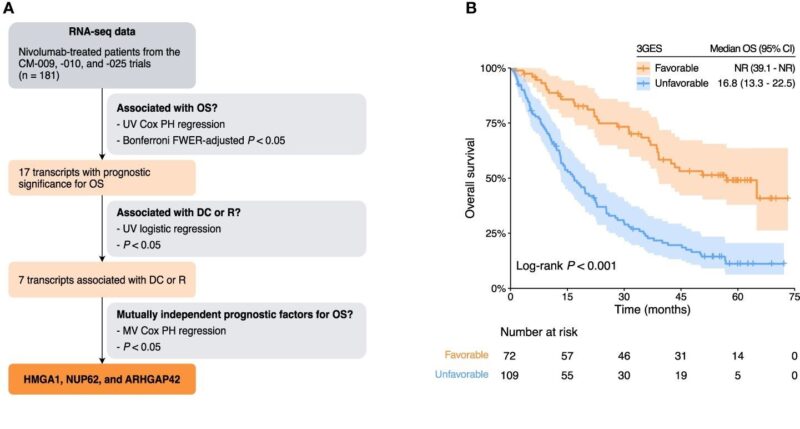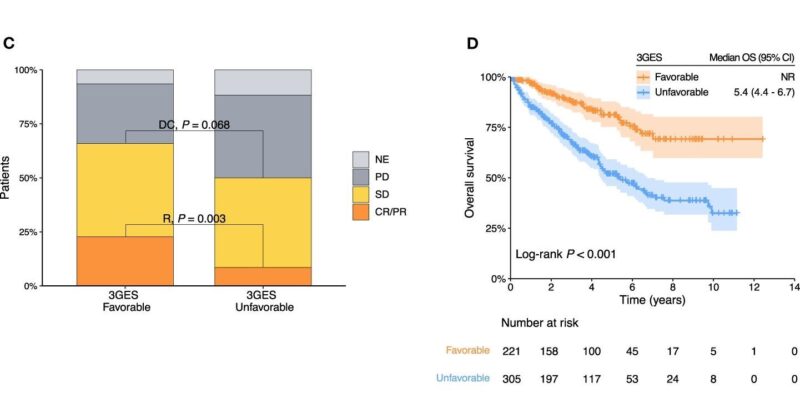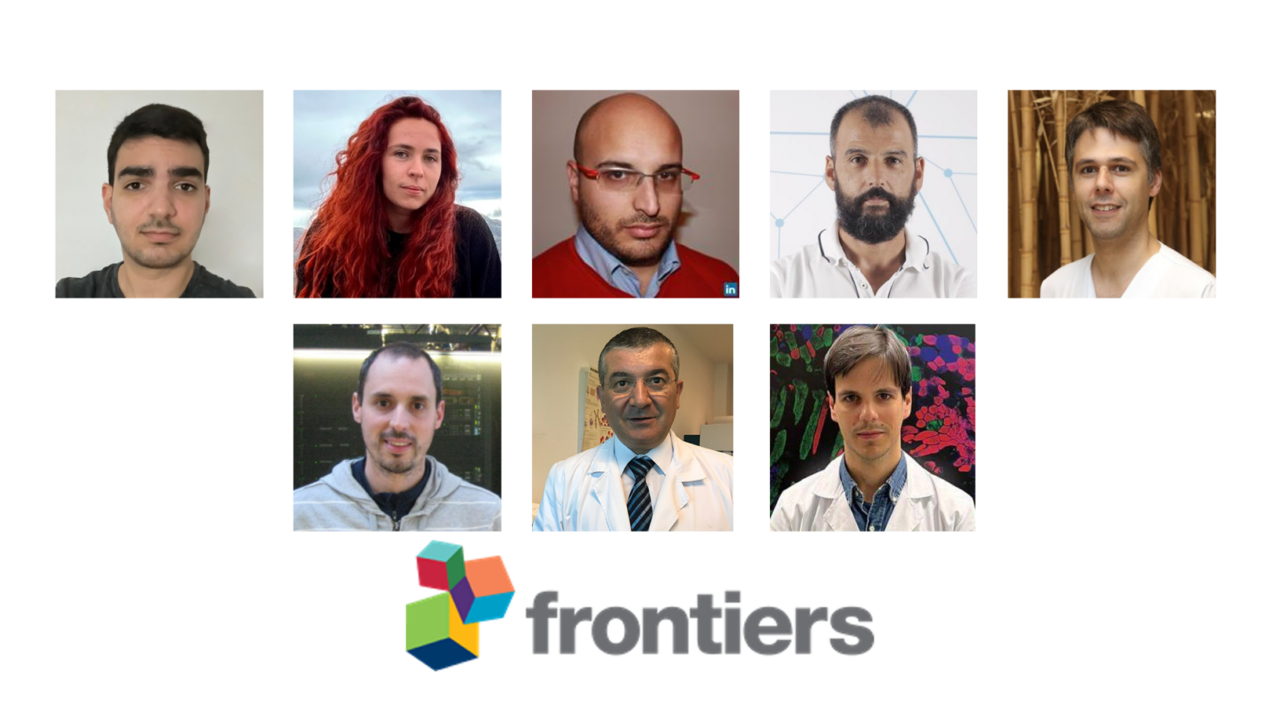New Paper Alert! A Novel 3-Gene Expression Score Predicts Immunotherapy Response in Advanced Renal Cell Carcinoma
Authors: Yoel Z. Betancor, Miriam Ferreiro-Pantín, Urbano Anido-Herranz, Mar Fuentes-Losada, Luis León-Mateos, Silvia Margarita García-Acuña, Vanessa Vaamonde-Rodríguez, Beatriz García-Pinel, Víctor Cebey-López, Rosa Villaverde-Viaño, Helena Lombardía-Rodríguez, Martin Kotrulev, Natalia Fernández-Díaz, Iria Gomez-Tourino, Carlos Fernández-Baltar, Jorge García-González, Jose M. C. Tubio, Rafael López-López, Juan Ruiz-Bañobre.
Published in Frontiers in Immunology, on April 10, 2024
Introduction:
The emergence of immunotherapy, particularly PD-1 antibodies, has revolutionized the management of patients with accRCC. However, the identification of reliable biomarkers to predict patient response to immune checkpoint blockade (ICB) remains a priority. This study aimed to develop and validate a gene expression score to predict the clinical benefit of the anti-PD-1 antibody nivolumab in access patients.
Design:
This study conducted a retrospective analysis of data from the CheckMate-009, CheckMate-010, and CheckMate-025 clinical trials to develop and validate a three-gene expression score (3GES) for predicting clinical benefit to the anti-PD-1 antibody nivolumab in patients with advanced clear cell renal cell carcinoma (accRCC). The prognostic value of the 3GES was then validated in the TCGA-KIRC cohort, and its predictive value was evaluated in the CheckMate-025 trial.
What We Learned:
- A 3GES was developed by integrating the expression of three genes (HMGA1, NUP62, and ARHGAP42) that were independently associated with overall survival (OS) in a pooled cohort of 181 nivolumab-treated patients.
- The 3GES was able to segregate patients into favourable and unfavourable risk categories, with the favourable-risk group showing significantly better OS, disease control rate, and overall response rate.
- The prognostic value of the 3GES was validated in the independent TCGA-KIRC cohort.
- In the CheckMate-025 trial, the 3GES showed a significant predictive value, with favorable-risk patients benefiting significantly more from nivolumab treatment compared to everolimus, while no such benefit was observed in the unfavorable-risk group.
- The 3GES was correlated with clinical, molecular, and immune characteristics of the tumour microenvironment.

Key Highlights:
- A novel three-gene expression score (3GES) was successfully developed and validated, enhancing the prediction of responses to nivolumab therapy in patients with advanced renal cell carcinoma (accRCC).
- The 3GES effectively identifies patients likely to benefit from nivolumab, distinguishing those who will respond favorably from those better suited for the standard care with everolimus.
- The 3GES provides crucial insights by correlating with distinct clinical, molecular, and immune characteristics within the tumor microenvironment, aiding in the understanding of the underlying biology.
- This score has the potential to become a valuable biomarker for selecting accRCC patients for immune checkpoint blockade therapy, pending validation in larger prospective clinical trials.
- Risk Group Differentiation: The 3GES delineates two risk groups with markedly different outcomes:
- Favorable-Risk Group: These patients experience significantly improved overall survival, disease control, and response rates when treated with nivolumab.
- Unfavorable-Risk Group: This group does not show a significant survival benefit when treated with nivolumab compared to everolimus.
- Molecular and Immune Profiling:
- Favorable-Risk Tumors: Characterized by PBRM1 mutations, lower immune cell infiltration, and reduced expression of exhaustion markers like CTLA-4, LAG-3, and TIGIT, suggesting an active immune environment.
- Unfavorable-Risk Tumors: Higher levels of immunosuppressive elements such as cancer-associated fibroblasts indicate a less responsive immune system.
- Strategic Treatment Implications:
- For Favorable 3GES Patients: Ideal candidates for less intensive monotherapy with anti-PD-1 antibodies.
- For Unfavorable 3GES Patients: May benefit from more aggressive combination therapies targeting multiple immune checkpoints or the tumor stroma.


Key Takeaway Messages:
- Clinical Application: The three-gene expression score provides a robust tool for predicting the effectiveness of anti-PD-1 therapy in patients with advanced ccRCC. By identifying patients more likely to respond favourably to immunotherapy, clinicians can tailor treatment strategies more effectively.
- Future Research Directions: For broader application in clinical practice, further validation of the 3GES through prospective studies and alternative measurement techniques like RT-qPCR is essential. Additionally, exploring combination therapies for patients identified with an unfavourable 3GES could potentially enhance treatment outcomes.
- Impact on Personalized Medicine: This study underscores the potential of genetic profiling in enhancing the precision of cancer treatment. As personalized medicine continues to evolve, tools like the 3GES can play a pivotal role in optimizing therapeutic strategies and improving patient quality of life.
Summary by Amalya Sargsyan, MD
About OncoDaily
OncoDaily was founded in 2023. It is a US-based oncology media platform, which features the latest news, insights, and patient stories from the world of oncology. Within a short period of time it became one of the leading oncology media platforms globally.
OncoDaily gathers content from various sources, including social media posts from renowned oncologists from all over the world, news from oncology societies and cancer centers, patient and survivor stories, and career-related information for professionals.
The mission of OncoDaily is to empower patients, survivors, and professionals with the knowledge and inspiration they need to fight cancer. The motto of OncoDaily is “Cancer doesn’t take a day off – neither do we”.


